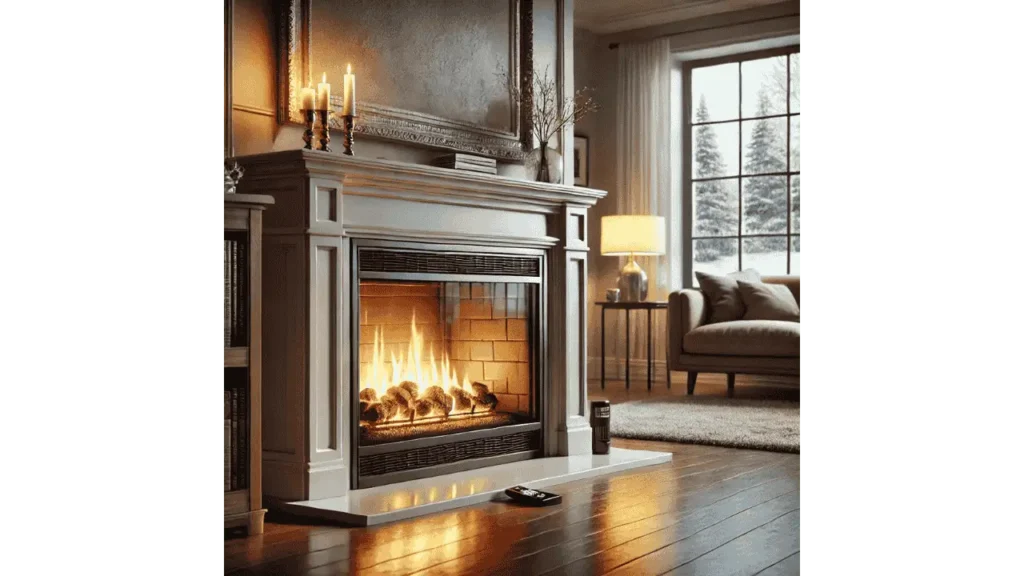Deciding whether to leave your gas fireplace’s pilot light on during winter can be tricky. You want the convenience of instant warmth but might worry about higher bills or potential safety risks. I’ve faced this dilemma myself, especially on those freezing nights when I didn’t want to mess with relighting the fireplace. In this article, we’ll look at the pros and cons of leaving the pilot light on, what factors to consider, and tips to keep your fireplace running safely and efficiently throughout the winter.
Should you leave the gas fireplace pilot light on during winter?
Leaving the pilot light on during winter is a common practice for many homeowners, but it’s not always a clear-cut decision. On one hand, keeping it on ensures instant heat whenever you need it, especially during the colder months. However, it does consume a small amount of gas continuously. I’ve found that leaving the pilot light on saves me the hassle of reigniting it every time I want to use the fireplace, but it’s important to weigh the convenience against potential energy costs. Let’s break down the pros and cons to help you decide.
Pros of Leaving Pilot Light On
Leaving the pilot light on during winter has its benefits, especially for those who rely on their gas fireplace for quick and easy warmth. Let’s look at two major advantages.
Instantaneous Heat and Warmth
One of the biggest perks is having instant heat at your fingertips. With the pilot light already on, you don’t have to wait or fuss with lighting the fireplace manually. I’ve found that when the temperature suddenly drops, the convenience of just flipping a switch for immediate warmth makes all the difference.
Convenience and Ease of Use
Keeping the pilot light on means you don’t have to go through the process of relighting it every time you want to use the fireplace. This is especially handy on those lazy winter mornings or evenings when you just want the heat without any extra steps. Personally, I’ve appreciated the convenience, especially during stretches of cold days when I’m using the fireplace regularly.
Cons of Leaving Pilot Light On
While keeping the pilot light on has its benefits, there are also a few downsides to consider. Let’s look at two main concerns that might make you rethink leaving it running all winter.
Energy Inefficiency and Higher Utility Bills
Leaving the pilot light on means it continuously burns a small amount of gas. Over time, this can add up, especially if your gas rates are high. Although the cost may seem minimal day-to-day, you could see a noticeable increase in your utility bills over the course of the season. I’ve noticed that when I left mine on for a few months straight, my gas bill crept up more than expected.
Safety Concerns
There’s also the potential for safety risks, especially with older fireplaces. A constantly running pilot light can increase the risk of gas leaks or malfunctions. While these risks are generally low, it’s something to consider, especially if your fireplace hasn’t had a recent inspection or if you have children or pets at home.
Factors to Consider
Deciding whether to leave your pilot light on depends on a few key factors. It’s not a one-size-fits-all decision, and taking these into account can help you make the best choice for your home.
Frequency of Fireplace Use
If you use your fireplace often during the winter, leaving the pilot light on makes sense. The convenience of instant heat outweighs the small energy cost. However, if you only use it occasionally, it might be worth turning the pilot off in between uses to save on gas.
Age and Condition of the Fireplace
Older fireplaces can be less efficient, and leaving the pilot light on in an older unit might increase safety risks. If your fireplace is showing signs of wear or hasn’t been serviced in a while, it’s a good idea to turn off the pilot light when not in use and schedule an inspection.
Local Climate and Weather Conditions
For those living in colder climates where the fireplace is in regular use, keeping the pilot light on provides constant readiness for heat. In milder regions where the fireplace is used less frequently, turning it off between uses can save energy without sacrificing too much convenience.
Tips for Safe and Efficient Operation
Whether you leave your pilot light on or off, there are a few important tips to ensure your gas fireplace runs safely and efficiently.
Proper Maintenance and Inspections
Regular maintenance is key to keeping your fireplace in good working order. Schedule annual inspections to check for gas leaks, faulty components, or wear and tear. This helps catch any potential issues early and keeps your fireplace running smoothly.
Adjusting Pilot Light Settings
Some fireplaces allow you to adjust the pilot light’s flame size. Keeping it at a low setting when not in use can help reduce gas consumption while still maintaining the convenience of a quick start when needed.
Using Fireplace Inserts or Supplemental Heating
Consider using a fireplace insert to improve efficiency. Inserts trap more heat inside and release it into your home. This can reduce the need to constantly run your pilot light or even offer better heating overall. For larger spaces, supplemental heating might also help reduce the load on your fireplace.
Regular Cleaning and Maintenance
Keep your fireplace clean by regularly wiping down the glass, checking for debris in the vent, and cleaning the logs. A clean fireplace operates more efficiently and safely, reducing the risk of soot buildup or blockages. Staying on top of maintenance not only ensures better performance but also extends the life of your fireplace.
The Bottom Line
Leaving the pilot light on in winter offers convenience and quick heat but comes with minor costs and safety considerations. By weighing factors like your fireplace’s age, usage, and local climate, you can decide what works best for your home. With regular maintenance and smart operation, your gas fireplace will keep things cozy and efficient all season long!
- 27 Farmhouse Fireplace Ideas That Bring Warmth & Charm - August 18, 2025
- 25 Fireplace Lighting Ideas to Illuminate Your Hearth - August 7, 2025
- How to Replace an Electric Fireplace Switch? - August 5, 2025



